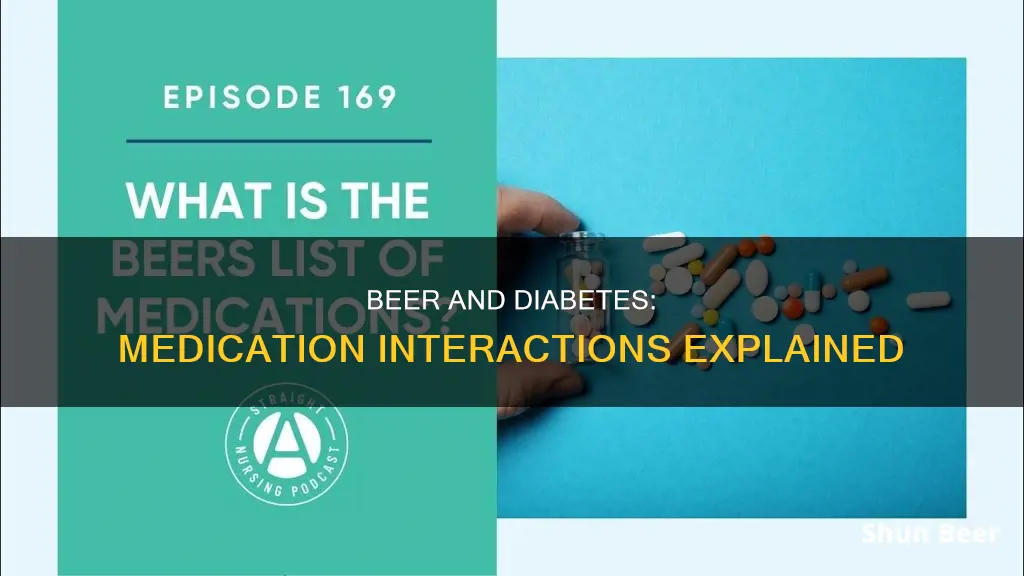
People with diabetes do not need to abstain from alcohol entirely, but it is important to be aware of how it can affect the body and how to manage this. Alcohol can interfere with how the body uses blood sugar and can also interfere with diabetes medication. It is therefore important to understand the possible risks of alcohol use and what you can do to lower them.
| Characteristics | Values |
|---|---|
| Can people with diabetes drink beer? | Yes, but in moderation.) |
| How much is considered moderate drinking? | No more than one drink a day for women and up to two drinks a day for men. |
| What is one drink? | One drink is 12 ounces, or one can or bottle of beer. |
| What are the risks of drinking beer for people with diabetes? | Drinking beer can cause low or high blood sugar, affect diabetes medicines, and cause other possible problems. |
| What are the symptoms of low blood sugar? | Double vision or blurry vision, fast or pounding heartbeat, feeling cranky or acting aggressive, shaking or trembling, tingling or numbness of the skin, and tiredness or weakness. |
| What precautions should people with diabetes take when drinking beer? | Drink with food, stay hydrated, monitor blood sugar levels, and carry a medical ID. |
What You'll Learn
- Beer is a significant source of carbohydrates, so it can impact blood sugar
- Drinking beer may contribute to weight gain over time
- Alcohol can interfere with the effects of some diabetes medications
- Drinking alcohol with diabetes medication can cause low or high blood sugar
- Drinking beer with diabetes medication may be safe in moderation

Beer is a significant source of carbohydrates, so it can impact blood sugar
Beer is a staple beverage for many, but it is important to be aware of its nutritional content, especially if you have diabetes. Beer is a significant source of carbohydrates, which can impact blood sugar levels. A 12-ounce can of beer typically contains 13 grams of carbohydrates, and these carbohydrates can significantly affect blood sugar. This is particularly important for people with diabetes, as their bodies may struggle to regulate blood sugar levels effectively.
When you have diabetes, your body may have trouble getting sugar from the bloodstream into your cells, resulting in hyperglycemia, or high blood sugar. This can damage organs and body tissues. In contrast, when people without diabetes consume sugar, their pancreas secretes insulin to help sugar enter the body's cells, where it is used for energy. Beer, due to its carbohydrate content, can influence these blood sugar dynamics.
The impact of beer on blood sugar is further influenced by the role of the liver. The liver is responsible for releasing glucose into the bloodstream to maintain normal blood sugar levels. However, when alcohol is present, the liver prioritises breaking it down, which delays the release of glucose. This can lead to hypoglycemia, or low blood sugar. The risk of hypoglycemia is particularly relevant for people with diabetes, as it can be challenging for them to recognise the symptoms due to the intoxicating effects of alcohol.
Additionally, beer can be high in calories, which can contribute to weight gain over time. The combination of carbohydrates and calories in beer can make it challenging for people with diabetes to manage their blood sugar and weight effectively. Therefore, it is essential for individuals with diabetes to be mindful of their beer consumption and its potential impact on their blood sugar levels.
To summarise, beer is a significant source of carbohydrates, which can affect blood sugar levels, especially in individuals with diabetes. The impact of beer on blood sugar is further influenced by the role of the liver in processing alcohol and releasing glucose. Additionally, the calorie content of beer can contribute to weight gain, making it more challenging for people with diabetes to manage their condition. As such, it is important for individuals with diabetes to monitor their beer intake and blood sugar levels closely.
Horse Beer Drinking: What's the Deal?
You may want to see also

Drinking beer may contribute to weight gain over time
The high calorie content in beer, coupled with the fact that alcohol is processed and stored in the liver as fat, means that drinking beer can contribute to weight gain. Calories from alcohol are stored in the liver as fat, and liver fat makes liver cells more insulin resistant, which can lead to higher blood sugar levels over time. This is particularly important for those with diabetes to be aware of, as it can make managing blood sugar levels more challenging.
Additionally, when you drink alcohol, your body prioritises breaking down the alcohol over releasing glucose, which can lead to low blood sugar (hypoglycemia). This can be especially dangerous for people with diabetes, as it can cause symptoms similar to alcohol intoxication, such as shakiness, lightheadedness, and even loss of consciousness. It is crucial for people with diabetes to monitor their blood sugar levels closely if they choose to consume alcohol.
Furthermore, drinking beer can also lead to what is commonly known as a "beer belly." Studies have shown that binge drinking can cause the body to store fat in the abdominal area, leading to a protruding stomach. This is not just a cosmetic concern but is also linked to various health problems, including type 2 diabetes, heart disease, and high blood pressure.
While enjoying a beer now and then is not inherently unhealthy, excessive consumption can have negative consequences. To minimise the risk of weight gain and other health issues, it is essential to practise moderation and be mindful of your overall calorie intake and nutritional needs.
Beer Glasses and Children: Safe Drinking Options
You may want to see also

Alcohol can interfere with the effects of some diabetes medications
When you have diabetes, your body has trouble getting sugar into your bloodstream for your cells to use for energy. This can lead to your blood having too much sugar, a state called hyperglycemia, which can damage organs and body tissues. When people without diabetes consume sugar, it is rapidly absorbed and utilised by the body. Their pancreas secretes insulin to help the sugar enter the body's cells, where it is used for energy.
The liver is where excess glucose is stored in a form called glycogen. When blood sugar levels dip too low, the liver converts glycogen into glucose, which is then released into the bloodstream to bring levels back to normal. However, the liver can't do this and metabolise alcohol at the same time, so it will focus on dealing with alcohol first. As a result, blood glucose levels remain low.
Drinking alcohol can cause hypoglycemia, or low blood sugar, because your liver, where glucose is stored, is also responsible for clearing alcohol from your system, so it may be delayed in releasing necessary sugars into the bloodstream. The risk of low blood sugar remains for hours after you take your last drink. The more drinks you have, the higher your risk. This is why it is recommended to only drink alcohol with food and to drink in moderation.
If you take insulin or certain types of diabetes medication, drinking alcohol can cause seriously low blood sugar. Alcohol can interfere with the effects of some diabetes medications, putting you at risk for low blood sugar or high blood sugar (hyperglycemia), depending on how much you drink and what medication you take.
Combining alcohol with medications that also lower blood sugar can result in serious interactions due to an additive effect. Alcohol use may change your blood sugar levels, so you should ask your doctor first if you can drink while taking medications.
Beer and Milk: A Dangerous Mix?
You may want to see also

Drinking alcohol with diabetes medication can cause low or high blood sugar
Drinking alcohol while taking diabetes medication can cause low or high blood sugar. This is because the liver, which releases glucose into the bloodstream to maintain normal blood sugar levels, prioritises breaking down alcohol over releasing glucose. This can lead to a drop in blood sugar levels, known as hypoglycemia, which can be dangerous. Additionally, drinking alcohol while taking diabetes medication can interfere with the effects of the medication, further increasing the risk of low or high blood sugar.
The risk of low blood sugar is higher when drinking on an empty stomach, after exercising, or when consuming excessive amounts of alcohol. It is important to be aware of the symptoms of low blood sugar, such as shakiness, lightheadedness, a fast heart rate, or unconsciousness, as they can be similar to the symptoms of alcohol intoxication. This can make it difficult to recognise and treat low blood sugar.
To minimise the risk of low or high blood sugar when drinking alcohol, it is recommended to drink in moderation, not on an empty stomach, and to monitor blood sugar levels before, during, and after drinking. It is also important to stay hydrated and be aware of the number of carbohydrates and calories in alcoholic beverages.
If you have diabetes, it is important to consult with your healthcare provider to understand the risks and how alcohol may affect your specific condition and medication regimen. They can provide personalised advice and guidelines for safe alcohol consumption.
Beer and Diabetes: What Diabetics Should Know
You may want to see also

Drinking beer with diabetes medication may be safe in moderation
It is important to note that drinking any form of alcohol can affect your blood sugar levels, so you need to be mindful of your intake and know your limits. If you are taking diabetes medication, it is always best to consult your healthcare provider to understand the possible risks and how to manage them.
Moderate alcohol consumption, defined as one drink per day for women and up to two drinks per day for men, generally does not affect blood glucose levels if your diabetes is under control. However, drinking on an empty stomach or after exercising can further increase the risk of low blood sugar. Therefore, it is recommended to drink with food and to stay hydrated by drinking water.
Beer is a significant source of carbohydrates and can be high in calories, depending on the type. It is recommended to choose light beers, which tend to have lower carbohydrate, calorie, and alcohol content. Additionally, drinking in moderation and monitoring your blood sugar levels before, during, and after drinking are important steps to ensure you maintain a healthy blood sugar range.
Some diabetes medications may have specific interactions with alcohol that can lead to dangerously low blood sugar due to the additive effects of both alcohol and the medication lowering blood sugar. It is crucial to discuss with your doctor whether it is safe to drink alcohol while taking these medications and to follow their recommendations.
In summary, while drinking beer with diabetes medication may be safe in moderation, it is important to be mindful of the potential risks, monitor your blood sugar levels, and follow the advice of your healthcare provider.
High Blood Pressure and Beer: Is It Safe?
You may want to see also
Frequently asked questions
Yes, you can usually drink beer safely if you have diabetes, but it's not without risks. Alcohol can affect blood sugar levels in patients with diabetes. Depending on how much and how often you drink, you may experience both low blood sugar (hypoglycemia) and high blood sugar (hyperglycemia). It's important to know how to drink safely to keep your blood sugar in a healthy range and avoid complications.
Combining alcohol with medications that also lower blood sugar can result in serious interactions due to an additive effect. If you are on insulin or other anti-hyperglycemic medications, drinking alcohol can lead to dangerously low blood sugar up to 24 hours after you stop drinking. Ask your healthcare provider if it's OK for you to drink alcohol and how to recognise the symptoms of low blood sugar.
Drinking beer may contribute to weight gain over time. Beer is typically higher in carbs than other alcoholic drinks, so it can impact blood sugar. Beer also contains calories and alcohol, which can lead to weight gain and make it harder to manage diabetes. Alcohol can also cloud your judgment, so you may not realise that your blood sugar is low.







